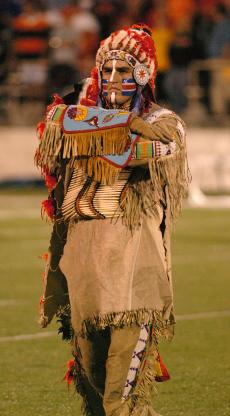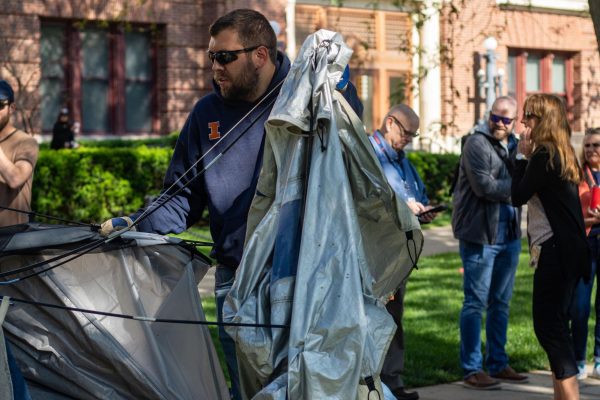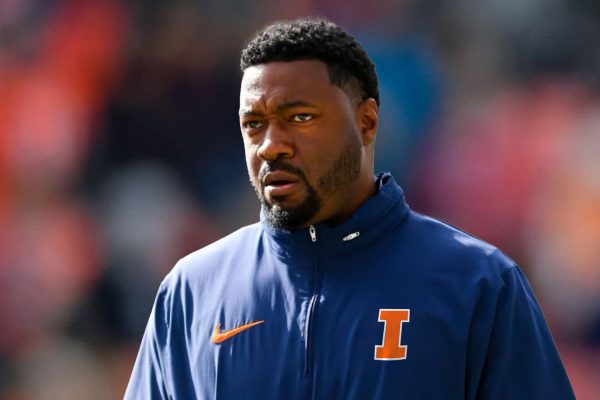Former Chiefs dispel rumors

Suzanne Stelmasek The Daily Illini Suzanne Stelmasek
September 5, 2006
It’s a catchphrase Tom Livingston has heard countless times before: Chief Illiniwek’s last dance.
Those four words first popped into headlines when Livingston portrayed the University symbol in the late 1980s and have appeared in news reports across the country for nearly two decades since.
Last Thursday the Chicago Sun-Times screamed the phrase across its front page. The controversial story inside claimed the University had a secret plan to hand control of Illiniwek to a group of former Chiefs including Livingston – who says the report was “a head-scratcher.”
In the five days since the Sun-Times story ran, media outlets from the Houston Chronicle to the L.A. Times have latched on to the story, declaring these the Chief’s final days. While many former Chiefs have met with University officials and the Board of Trustees as the school looks to plan Illiniwek’s future, none say the report is correct.
“Everything that was reported in the Sun-Times was premature, at best,” former Chief Matt Veronie said. “The Chief being done is not a foregone conclusion. This informal ‘Council of Chiefs’ taking over is not a foregone conclusion. They’re possibilities, but that’s it.”
Get The Daily Illini in your inbox!
Livingston and Veronie are two of several former Chief Illiniweks who have been actively involved as the University looks for a “consensus resolution” to the debate surrounding the symbol. A handful of alumni who once portrayed Illiniwek met with the Board of Trustees earlier this year to discuss potential solutions to the ongoing debate.
Assigning responsibility for the Chief to that group was one suggestion offered at that meeting. But there are currently no plans to do so.
“No, there is no current plan for ending the Chief Iliniwek tradition or somehow changing that tradition,” University spokesman Tom Hardy said. “The Chief is performing as usual, as he has been doing at volleyball, as he did at football this weekend.”
Kyle Cline, who stepped out of the Chief Illiniwek role when he graduated last spring, said many of the former Chiefs are very involved in maintaining the tradition. Former Chiefs are part of the board that selects each new student who portrays Illiniwek and are crucial to helping new students learn the intricacies of the job.
Former Chiefs also act as spokesmen for the symbol, since the current Chief generally does not grant interviews and focuses his energy on performing.
“I looked to those guys a lot for advice when I was in the role,” Cline said. “They are already involved in the present and in the future of Chief Illiniwek.”
While the Sun-Times story referred to the “Council of Chiefs” as an organization of the former Chiefs, no such group truly exists. The former Chiefs stay in contact informally. They do not, however, have a letterhead, leadership positions or any other hallmarks of an organized club.
Cline said that any contact former Chiefs have with the Board of Trustees is in an advisory context.
He said Board members have consulted former Chiefs for information about how the tradition of Chief Illiniwek is carried out.
“If you want to know how it is to portray Chief Illiniwek, you call the people who did it,” Cline said.
Livingston said University officials have suggested the former Chiefs offer ideas for solving the debate.
But he stresses that former Chiefs are only one of many groups being consulted and that they will not have any vote in the final decision.
“I’m not sure we’re going to be on the same page with the University at the end of this process,” Livingston said. “And then they’re going to have to make their own decision.”
Livingston and Veronie said they were both taken aback by the Sun-Times story. Livingston said it seemed like the Chicago media might be learning what people in Champaign already knew and misinterpreting certain pieces of information. Veronie said the meetings with the Board were never secret, but no one thought it was important to publicize them.
“It’s not about the limelight; we’re not out there seeking attention,” Veronie said. “The fact that people haven’t heard about this before is just because we weren’t out promoting it.”
In April, the NCAA issued a final decision banning Illiniwek from postseason competitions and prohibiting Illinois from hosting those events as long as the Chief exists. At that time, Hardy said, many interest groups began a discussion about what future action the University might take.
“Everybody who is concerned about the University, about the Chief Illiniwek tradition, about our ability to run a high-level athletic program began to throw out ideas, to brainstorm,” Hardy said. “These men are just one group interest in playing a role. They’d like to see it continued, but they understand that may not happen.”
Livingston said it is likely the Chief tradition could change in the next year. Whether that will be a change of ownership, change of venue, retirement, or some other possibility, has yet to be determined.
“I have seen the Chief’s obituary written many times before,” Livingston said. “But so far I’ve never attended the funeral.”






